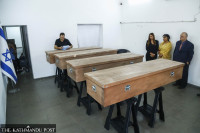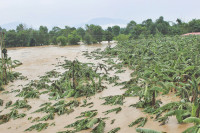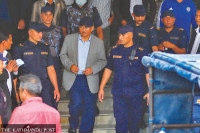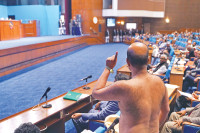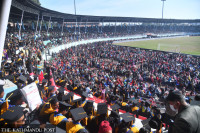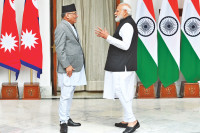Special Supplement
Nepal’s historic leap towards a federal system has not been as smooth as everyone expected
Starting in 2018, Nepal made a big leap towards a federal system from a unitary state. This historic transformation has not been smooth as the federal and subnational governments bicker over devolved powers.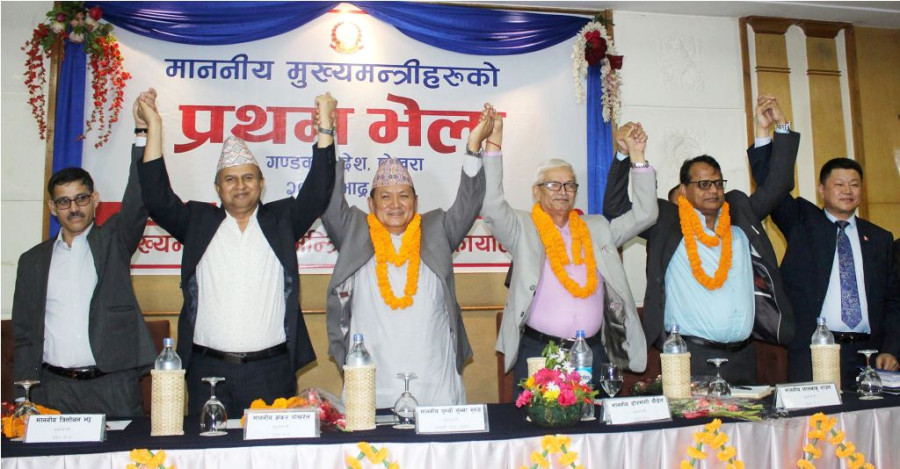
Prithvi Man Shrestha
When Province 2 Assembly endorsed its Provincial Police Act on October 13 without waiting for the Federal Police Act, the reaction from those in Kathmandu’s corridors of power was strong and swift.
“Chief Minister ji, the country will have an accident if you try to overtake the provision of the constitution. Don’t invite accident,” ruling Nepal Communist Party Co-chairman Pushpa Kamal Dahal sounded out a warning aimed at Province 2 Chief Minister Lalbabu Raut during a function in Janakpur on October 23.
Earlier in September, when six chief ministers huddled for a quick meeting in Pokhara ahead of the Inter-State Council meeting, Prime Minister KP Sharma Oli abruptly cancelled the meeting at the last hour.
These two incidents sum up how those at the helm of power in Kathmandu see federalism. It also suggests Nepal’s historic leap towards a federal system from a unitary system has not been as smooth as expected, as Kathmandu remained reluctant to devolve power to the provinces.
Handicapped by a lack of legislation and human resource, the chief ministers repeatedly asked the federal government for its prompt intervention in clearing the legal and administrative hurdles.
While Province 2 Chief Minister Raut was the most vocal critic of the Oli government, chief ministers of the ruling party also opposed the central government’s indifference.
Reluctant Kathmandu
It took nearly 10 months for the federal government to chart out a new deadline for power devolution which would enable subnational governments to stand on their own. But it was only after the Province 2 government threatened to bring three more laws that the federal government finally agreed to give some space to the provinces.
On October 28, the Cabinet issued an executive order allowing the provincial police chief to mobilise personnel up to the sub-inspector level in close coordination with the provincial government and the Ministry of Internal Affairs and Law for keeping order and providing security.
Province 2 Chief Attorney Dipendra Jha said that Kathmandu’s reluctance to shed power to the provinces was reflected highly in the delay in formulating the Federal Police Act and executive order which has not given the provinces any greater say than before.
“Both political and police leadership seem reluctant to shed power of police to the provinces,” he said.
The secessionist forces active in Province 2 led by CK Raut have also brought apprehension among the political elites for shedding more power to the provinces, according to political experts.
Political analyst Krishna Khanal said there are fears among the political leadership and some sections of society that the implementation of federalism could invite a grave political disaster in the country that can perhaps lead to secession at a later point. “This mentality is not in line with the concept of federalism,” he said.
Provincial governments are also not happy with the Civil Servants Adjustment Ordinance which they claim will discourage civil servants to go to the provinces and local units.
“This ordinance smacks of a centralised mentality. It will obstruct the career growth of the employees at the provinces and local units as they cannot return to the federal civil service,” said Province 1 Minister for Economic Affairs Indra Angbo. “This offers opportunities to those under the federal service to climb the bureaucratic ladder to become secretary and chief secretary of the federal government,” he continued. “That’s why civil servants are unwilling to take up jobs at the provinces and local units.”
Results of a recent O&M survey also revealed that unusually high number of offices and staff were retained by the Centre, suggesting the centralised mindset of the bureaucrats.
According to a senior official at the Federal Affairs Ministry, initially it was planned to keep around 30,000 employees at the Centre but the survey concluded that there should be over 46,000.
“With federal ministers unwilling to give up a number of offices, they remained under the Centre,” the official said.
For example, most of the Divisional Road Offices remain under the Centre although there is no need to retain them, he said.
Bone of contention
While the constitutional mandates are clear, the absence of consistent political will on part of the federal government caused uncertainties, leading to unwanted disputes and confusion between Kathmandu and subnational governments. “The Centre is reluctant and slow to devolve power which is a common trait in the history of power devolution the world over,” said economist Achyut Wagle.
“This constraint needs to be offset by the demand-side strength of the local and provincial governments. This exactly is the cardinal problem to effectively implement federalism in Nepal,” he said.
The dispute is basically seen in three areas—formulation of laws, human resources and resource sharing.
The provinces and local governments say delay by the Centre in introducing the laws, which guide them to formulate their own laws, prevented them from exercising the power that the constitution has guaranteed while the lack of human resources has affected service delivery. They also have reservations over the current revenue sharing mechanism dictated by the federal government against the recommendations of the National Natural Resources and Fiscal Commission.
The provinces have been demanding that the federal government introduce some of the vital legal documents, including Federal Police Act, the Federal Civil Service Act and the standards for establishing the Provincial Public Service Commission. Besides, about three dozen laws related to concurrent powers need to be introduced, according to the Law Ministry.
Although the constitution has given the provincial government sole authority of maintaining law and order within their geography, the provinces have been unable to exercise this constitutional right in the absence of provincial police force as the federal legislation should guide such law.
One of the major complaints of the provinces and local levels is that the federal government accumulated a larger share of resources despite going into the federal model where rights and responsibilities have been handed over to the lower levels.
Of the total Rs1.31 trillion budget allocated for the current fiscal year, the Centre has retained Rs1 trillion while the rest has been distributed among the provinces and local units. Of the targeted revenue projection of Rs890 billion, the provinces are expected to receive Rs60.42 billion and local units Rs53.82 billion, according to the budget.
They have reservations over the provision of revenue sharing in the Inter-Government Fiscal Arrangement Act as it has given just 30 percent share from value-added tax and excise duty to the provinces and local units. As per this law, half of the royalty from natural resources should be provided to the federal government while the rest goes to the provincial and local governments.
The provinces have been demanding that the provincial and local governments should have access to at least 60 percent of total resources in line with the responsibilities given to the subnational governments.
“How can the development activities move forward and goal of prosperous Nepal be achieved when resources are concentrated at the Centre while roles and responsibilities go to the provincial and local levels?” asked Angbo.
Those sentiments reverberated also during the Inter-State Council Meeting held on December 9 and 10, where the chief ministers termed the current revenue sharing model “unfair”. They also called on the federal government to establish the National Natural Resources and Fiscal Commission, a body responsible for sharing the resources among the three tiers of government.
The Centre is also reluctant to provide revenue rights to the local governments. When the local governments started charging tax on house rent last year in line with the constitution, the federal government stopped them from doing so, arguing that it is a part of income tax. Finally, the Centre conceded defeat after strong protests from the local units.
Likewise, the Centre’s intervention in the number of taxes imposed by the provincial and local governments including District Export Tax, wealth tax, among others, also invited disputes between the Centre and subnational governments.
Former chief secretary Som Lal Subedi noted inherent culture of accumulating absolute power is at the heart of the current difficulty in implementing federalism. “We don’t have the culture of power-sharing at both political and administrative levels,” he said.
Way forward
The two-day Inter-State Council Meeting did manage to warm up the relations between the Centre and the provinces.
The home minister-led committee submitted a report to the prime minister with recommendations of time-bound action plans to complete works related to the formulation of laws, government staff adjustment and formation of the National Natural Resource and Fiscal Commission.
As per the recommendations, the Centre should complete staff adjustment by mid-January, draw up and introduce all the necessary laws for implementing federalism and form the fiscal commission by mid-March.
“It took a long time to take measures to address our concerns. But this is a step in the right direction,” said Province 5 Chief Minister Shankar Pokharel, who is also a member of the high-level committee.
Despite disputes on a number of issues between the Centre and the provinces and local units, experts and political scientists take a positive outlook, urging everyone concerned to take them to the negotiating table for keeping spats from spiralling out of control.
The current problem arose due to the lack of adequate consultations among the stakeholders, pointed out Khanal, but said, “subsequent meetings of the Inter-State Council could help bridge the divide.”




 16.12°C Kathmandu
16.12°C Kathmandu
